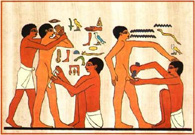Although scientists have reported that circumcision has been shown to reduce heterosexual men's risk of getting HIV from sexual intercourse with women, a new study now says there is not enough evidence to say circumcision protects men from getting HIV during sex with other men.

One of the oldest and most common surgical procedures in the world, male circumcision is the surgical removal of some or all of the foreskin (or prepuce) that covers the head (glans) of the un-erect penis. Compared with the dry external skin surface, the inner mucosa of the foreskin has less keratinisation (deposition of fibrous protein), a higher density of target cells for HIV infection (Langerhans cells), and is more susceptible to HIV infection than other penile tissue in laboratory studies. The foreskin may also have greater susceptibility to traumatic epithelial disruptions (tears) during intercourse, providing a portal of entry for pathogens, including HIV. In addition, the microenvironment in the preputial sac between the unretracted foreskin and the glans penis may be conducive to viral survival. Finally, the higher rates of sexually transmitted genital ulcerative disease, such as syphilis, observed in uncircumcised men may also increase susceptibility to HIV infection. Source: Centers for Disease Control and Prevention
Circumcised gay men were 14 percent less likely to be infected with the human immunodeficiency virus, or HIV, than those who were uncircumcised, but the finding was not statistically significant, the researchers said.
"Over all, we're not finding a protective effect associated with circumcision for gay and bisexual men," said behavioural scientist Gregorio A. Millett. The study is published in the October 8 issue of the Journal of the American Medical Association (JAMA).
Millett and his colleagues reviewed 15 studies which involved 53,567 (52 percent of whom were circumcised) gay and bisexual men in the United States, Britain, Canada, Australia, India, Taiwan, Peru and the Netherlands.
Report info
"Circumcision Status and Risk of HIV and Sexually Transmitted Infections Among Men Who Have Sex With Men: A Meta-analysis"
Gregorio A. Millett; Stephen A. Flores; Gary Marks; J. Bailey Reed; Jeffrey H. Herbst
JAMA. 2008;300(14):1674-1684.
Vol. 300 No. 14, October 8, 2008
Click here for Abstract.
